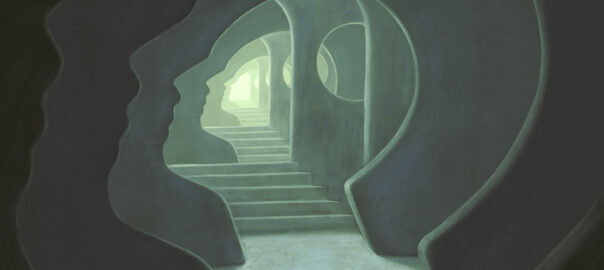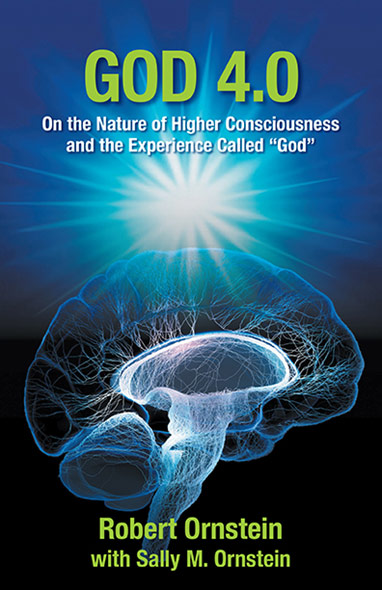
Lost and Found: An Encounter with the Intuitive Mind
David S. Sobel, MD | November 15, 2022
After working on a book manuscript for over a year, I was excited when I was finally called to pick it up from the typist. This was some years ago, well before word processing, personal computers, flash drives, and cloud storage. When I arrived there, I took into my hands the thick stack of paper, which was the only copy of the book. Let me say that again: the typed manuscript I was holding was the only copy on earth of my precious new work.
I carefully placed the papers in a thick canvas bag and headed to my San Francisco apartment. I could not wait to get home and begin to proofread the manuscript before turning it over to my publisher. Once there, I unlocked my apartment door and placed the canvas bag down to hold the door open while I carried several bags of groceries into my kitchen. Big mistake. I heard my apartment door slam shut. Curious, I thought. I was pretty sure I had secured it. When I went to check the door, it was indeed closed. And when I looked for the canvas bag with my manuscript it was gone. Vanished.
My mind snapped. In panic I raced out of the apartment and looked up and down the street for my missing bag. At that point my body took over. I dashed up the street and turned down an alleyway. I had no idea of why I turned right instead of left, or why I chose that particular alley out of many. As if on rails, I proceeded down the alley and suddenly spotted the canvas bag and my beloved manuscript scattered behind a garbage can. Clearly, the thief had rifled through the bag, and, finding nothing of value, tossed the sheaf of worthless papers.
I have no rational explanation for why, or how, I ran directly towards the manuscript. My rational mind was in a panic, not thinking clearly. In a sense, I was out of my mind. More likely, my rational mind was temporarily disabled as other parts of my mind took over and guided my body by some hidden sense. While my rational mind spun endlessly in panic, my body seemed to know exactly what to do, and where to go.
This tangible and visceral experience indicated that my everyday consciousness with its focus on linear and rational thought was not all that was available to me. Whether, as in this case, triggered by panic, or deliberately cultivated and developed, human capacities can be activated to allow us to perceive the wider and deeper connections between things.
Of course, such shifts in consciousness can be more, or less, dramatic and impactful than my example of the lost and found manuscript. Many of us have experienced unusual and inexplicable moments of precognition, or intuition, in our everyday lives, that seem to defy standard logic and reason.
Creative insights also seem to arise from a shift in consciousness. When I work hard on a problem (from how to repair a broken appliance, to how to organize the chapters in a book I am writing), I sometimes become frustrated and exhausted, and temporarily set the problem aside. Sometimes later that same day, or perhaps the next day, or even in a dream, the solution suddenly pops into my mind, revealing new connections and insights.
What happens at the moment of insight? Authors Robert and Sally Ornstein, in their book, God 4.0: On the Nature of Higher Consciousness and the Experience Called ‘God’ describe research that illuminates the “brain blink” that occurs with insight.
When you have that “eureka experience,” it seems to appear out of nowhere. But in fact, the left hemisphere of your brain has actually been working continuously behind your “scenes,” in an intense, moment-to-moment, bit-by-bit mental search for relevant information — until it finally gets stymied and, at that point, goes offline. The brain switches over to its right hemisphere, to explore unpredicted ideas and associations.
Such “aha” moments are examples of shifts in consciousness that may range from small daily insights, to breakthroughs in artistic and scientific creativity, to transcendent understandings. The authors describe this as a “second system of cognition.”
The “second system” is a quiescent faculty; accidents can activate it, as can certain procedures, such as meditation, isolation, fasting, overstimulation, prayer and the use of drugs which have appeared in every known society. They all involve a breakup or a bypass of normal cognition, and the opening of “another world,” as it has been called metaphorically.
We now know how the mind and brain do this, and for the first time, we can explore how this innate mode of cognition can be activated in a way relevant to the rapidly changing modern world. The capacity for this development is a part of everyone’s natural endowment. All of us possess a nascent, intuitive sense which is the basis of an expanded consciousness; but it is not fully developed in most of us, just as a lot of other human capacities lie embryonic and untrained.
It may be that our ancestors were more familiar and experienced with exploring these altered states of consciousness. I know that in racing up that alleyway I found more than a lost manuscript: I caught a glimpse of such “embryonic and untrained” human capacities.
David S. Sobel, MD, is an Adjunct Lecturer in the Department of Medicine at the Stanford University School of Medicine. He is coauthor of ten books including three with Robert Ornstein, entitled The Healing Brain, Healthy Pleasures, and The Mind & Body Health Handbook.
Recent Blogs
- Our Subpersonalities and Many-Sided Selves
- An Old Story About Metaphysics
- The Conditioning Machines in Our Back Pockets
- Out on a Limb: The Danger of our Innate Shortsightedness
- Edward T. Hall: Culture Below the Radar
- The Half Brain Method
- 'He Who Tastes Knows': Contemporary Sufi Studies and the work of Idries Shah
- "They Saw a Game"
- A Funny Thing Happened on the Way to Enlightenment
- Finding the Right Way Home
- Time and Self
- Escaping the Either/Or Thinking Trap
- Looking Up, Looking Out
- Conditioning and the Gendered Brain
- New World, Same Mind?
- One Small Word
- Meaning: The Enduring Gift to Spirit
- Beyond East and West: Human Nature and World Politics
- Forest Smarts: A Part of or Apart From?
- How to Improve Group Decision-Making
- We Know More Than We Think We Do
- How Deep Can a Story Go?
- Lost and Found: An Encounter with the Intuitive Mind
- The Devil’s Tuning Fork
- Welcome to The Human Journey Blog

